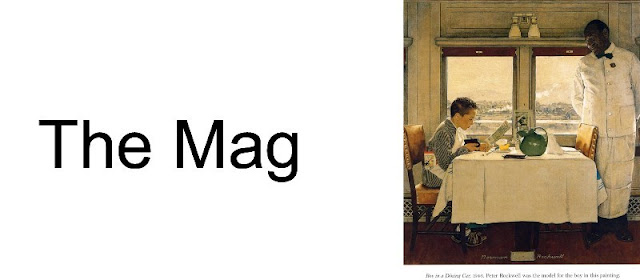Boy George
An idyllic image: a boy absorbed in a tale
of adventure while George stands
lost in his own fantasy: a chair to relieve the daily
sixteen hour shift endured with a smile.
Both coiffed, proper and fine as the crisp linen;
each sure of his station.
Both called boy.
Pullman Porters
Pullman porters were called George regardless of their names and were expected to prepare their cars, uniforms and stations on their own time in addition to standing their entire shifts. Often they worked up to twenty hours a day.
linked with The Mag #185
linked with Open Link Monday.




This was thought provoking and compact. So much said in so few words. It is perfect.
ReplyDeleteThank you, LaTonya
oh god, that last line so unexpected... true, but i was knocked wordless by its power
ReplyDeleteexcellent work
Oh, and like yours as well. The boy's point of view reveals much.
DeleteYou got this one, LaTonya. I don't know how anyone else would dare write a thing after reading your poem. Potent, painful, true.
ReplyDeleteAnd that's what irked me about this picture...
ReplyDeleteGlad to hear I was not alone. I almost entitled this F- Rockwell. :-)
DeleteYou nailed this to the wall. Perfect.
ReplyDeleteMama, I know you don't blow sunshine up people's backside so thank you ma'am.
DeleteJust checked out the prompt. There are multiple posts after mine. Now that I've had a nap and having read your responses, I posted this reply:
ReplyDeleteWhen I saw the picture I was compelled to write. At first I thought the choice was tied in some way to the recent movie "The Butler." That however did not diminish the reality of the period. If this is the only way to see my face in a Rockwell painting, Frack, Rockwell. That's what I felt. I felt no swooning for the setting, not the handome boy or childhood memories of trains.
Then I read early entries and they didn't even remotely reference the image. Subsequent comments suggest either denial or refusal to address the history here.
Well, to me the image was screaming for rejection, some level of indignation.
I adore your poem. So much depth, so much raw honesty.
ReplyDeleteTHANK YOU for the indignation in your words, your voice, your hearing of the image.
Out-freaking-standing. Brava.
ReplyDeleteYep, you told a story here, true and certain. Like that "both called BOY!
ReplyDeleteShort and Sweet!
powerful, thoughtful, last line - for all ages and sexes too.
ReplyDeleteI'm surprised more responses weren't like yours. I'm not doing any memes today (got a longer work in progress), but I don't have to be black for the obvious race-class assumptions of that era to slap me across the face. I can't even think of a way to put a positive spin on that picture, although I doubt it had nearly the connotations then that it does now. In that era, work as a Pullman porter was considered a good job.
ReplyDeleteAs an interesting point of comparison, the Harvey Girls (who were mostly white) worked similarly long hours on their feet, were held to rigidly high standards and infantalized through restrictions on all aspects of their personal lives, but they still thought they were getting a pretty good deal.
It's no accident that activists for racial equality and gender equality have often worked in tandem or at least helped each other out.
Ann, I hear you. You don't have to be black so why the silence? I can't answer that. In this space though, we keep it real. I've missed reading you. Life got crazy. My apology for my absence. Will be by soon.
DeleteYes, it was considered a good job. And yes, we could talk equally as much about gender equality.
DeleteOh wow! That last line is killer. I tried to see something other than prejudice in this picture. I tried very hard. But, I just didn't see anything else.
ReplyDeleteGlad to hear it.
DeleteAs someone who works on her feet for about half of that number of hours a day, I can't imagine. But it is the anonymity of it, the depersonalization, that sounds even worse.
ReplyDeletegreat last line......thanks for this
ReplyDeleteSuccinct and thought provoking! Sadly your last line tells the truth of the times when this painting was created. Prejudism may not be quite as obvious and as prevalent now as it was in the 1940's but unfortunately it still exists. Prejudism has no place in this world ... after all, peel back the skin and we're all the same underneath... just flesh and bone! Great Mag!
ReplyDeleteboth are lost in their own thoughts..
ReplyDeleteAmazing poetry ... the last line? Riveting ...
ReplyDeleteH'mm, yes, I was uneasy with the painting, too.
ReplyDeleteThese few lines tell the whole story as sparingly as the picture itself, revealing the tension beneath the surface of the composition, the spacing and power dynamic of the bodies within it.
ReplyDeleteI remember train travel back then. When I was still fairly young - ten or eleven? - my mom would put me on the train to travel to my grandma's for the summer and the porter would look out for me. I doubt he was paid anything for his trouble either. Yes, the anonymity must have been so hard to endure, along with the harsh working conditions and low pay. Sigh.
ReplyDeletewonderfully done with just a few words
ReplyDeleteWell put!
ReplyDeleteK
Short yet very effectively portrayed ~
ReplyDeleteLet me hold this nail. I'll even close my eyes. Because, LaTonya, when you put down the hammer? Dead-on.
ReplyDeleteM, what's the quote? Someone had to do it? Isn't that artists do, speak the truth?
DeleteVery well written. Perfect ending.
ReplyDeletePowerful.
ReplyDeleteSo moving! Wow. I pondered this painting and almost didn't write to it as I didn't know how to explain my feelings - It is the face of the black man that I kept moving back towards and whom I finally based my short poem .
ReplyDeleteDon't throw Rockwell under the train yet. You might find this interesting: http://kenlairdstudios.hubpages.com/hub/The-Problem-We-All-Live-With---Norman-Rockwell-the-truth-about-his-famous-painting
In so few words you conveyed so much, powerful you gave me chills
ReplyDeleteWell, that was certainly a shot between the eyes. Very well cone!
ReplyDeleteA wise and powerful write La Tonya...:-)
ReplyDeleteAnd nothing but the truth. Well done indeed.
ReplyDeleteAnna :o]
So, as a painting I still find it gorgeous, as a comment on what is, I love your poem. The final line is stunning in its quiet simplicity.
ReplyDeleteThank you.
Delete